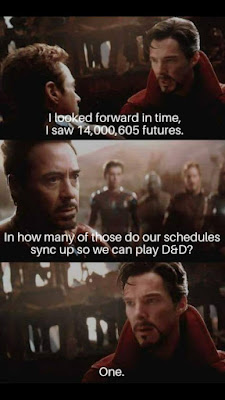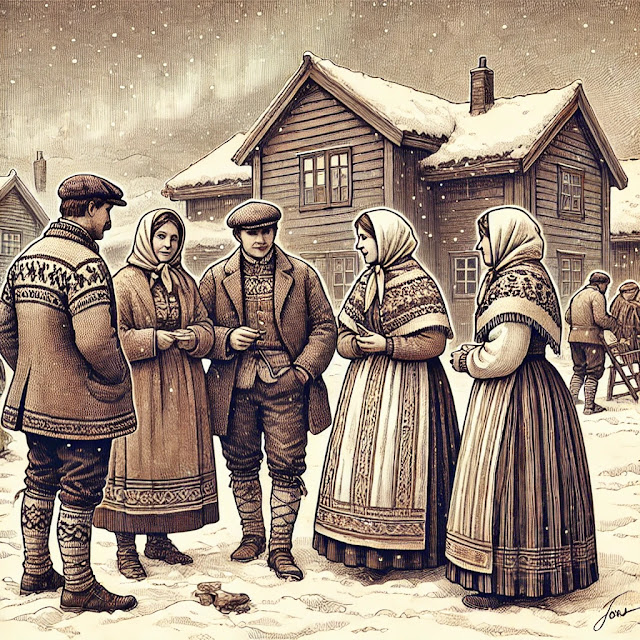Dealing with the Schedule of Death
In this post, I’m going to outline some ideas for how to handle campaigns when it’s difficult to get the same players at the table consistently. You have probably seen the memes. Maybe experienced it first hand yourself how hard it can be to schedule a game.
What I offer is by no means a silver bullet, but it may make things easier to run. And of course, none of this is necessary if just one of your players will miss the session. This is more relevant for those who have several players missing. The first thing to tackle is…
Linearity
For many it is a foregone conclusion that whatever follows in the next session should be in continuation from the last session. But is that really necessary? In my mind, it isn’t. It may be at odds with consistency, but it hasn’t surfaced often as a problem in my games. Put a pin in that - One Shot Mentality
What benefits are there to non-linearity? Let’s say you have a group that is crawling through the tomb in Winter’s Daughter and your group stops roughly a third into the dungeon. Before the next session, you learn that two of your players cannot join, but another player who wasn’t around this session can join. In this case, you could set up another dungeon to run with the “new” group, which could either happen before or after the tomb in Winter’s Daughter. If you want some consistency, just track the “fungible” items like rations, torches and treasures per crawl instead of directly on the characters.
Another way to approach a non-linear campaign is just to accept that the fiction is “unreliable”. Regardless of what happened between sessions, you can make it happen into whatever fits your logistical situation. Oh, so two players couldn’t make it, but a new player could? Well, instead of running a new group and tracking new stuff, maybe just have it be that the missing players’ characters headed back to the entrance to hang out and rest (maybe even set up camp?). Exactly how the new player got there? Just decide why and how, and don’t get caught up in the details.
To summarize a bit, having a non-linear campaign enables you to run satisfactory games without the players feeling like they missed out or that the session was less than it should be. If you’re worried about consistency, I’d say that verisimilitude should help make play better, not get in its way.
One Shot Mentality
Another way to avoid consistency issues is to just run everything as if they were one shot sessions. This does not get in the way of running an adventure or campaign in general, it just means that towards the end of the session, the PCs will return to their base. Ideally, you can make a lot happen in one session, exploring at least 4 rooms or so. Others have run Ravenloft as a one shot, and so can you!
The advantage with this approach is consistency is sort of maintained, and it doesn’t become an issue if more than half the group is missing for the next session. Another advantage the one shot mentality enables is flexibility in the referee. The more you run one shots, the more you are able to try something different for a change if you and the players feel for a palate cleanser. Maybe today’s session is set in Star Trek or some nameless cyberpunk megapolis, instead of the Dark Sun campaign you had been running for a while. After all, your campaign will be waiting for you all, so there’s no harm in trying different things out. Of course, this will also be a lot easier if you run games FKR style.
This isn’t so much a blessed and unique idea coming from my galaxy brain as much as it is me and my friends trying to adapt the West Marches concept.
Another thing I dealt with in the past was that several of my players “read on the internet” that there were people playing the same campaigns for years or decades, and they wanted that too. Let’s just say, what you want isn’t necessarily what you need. Make an informed decision about what campaign you and your players want to play, and what better way to be informed than having experienced lots of different settings?
Stuff!
So when I originally wanted to write this post, I was thinking about ways to run a sci-fi campaign which leaned into having an open table. In doing so, I considered various “technologies” found in different franchises that you could use. But you can take these things and apply them to many genres, really. The overall idea is that they provide conveniences for you as a ref to run games without having to worry too much about consistency.
For example the “Needlecast” from Altered Carbon would let you upload and transfer your consciousness to another world at an FTL rate. Maybe the players characters aren’t just a bunch of bodies, but a set of minds that get copied and sent across the galaxy to explore. This would make the concrete things they have more fungible (including their bodies), since only the minds get sent around. Once an adventure on Prasinox V is concluded, the mind is transferred back to the “Nexus” and syncs with all the other images of the character out there. The next time you play, you carry forward the experiences from Prasinox V.
Another idea I have is the “Be There Drive”, where the players that are going to the next session just decide which solar system they want to be in, and the ship is there the next time. Exactly how the ship gets there isn’t necessary to be concrete about, but you can pick some options here. For example, you could have the players start in the solar system they want, and just deduct the proper amount of fuel and whichever upkeep costs you bother to keep track of. Once the session ends, it is assumed that the players go back to their ship. Speaking of…
How do the players get back to their ship, wherever they are?
Of course, you could also use cool vehicles that pop out of some sufficiently technological device like this:
I kind of like the idea of a portable device that somehow materializes a vehicle in a set that allows you to move on ground, in the air, or in space. Maybe you have to upgrade or encode better patterns into the item to get more sleek ships, but overall it affords the player character a bunch of portability. It’s also not too dissimilar to a Paladin’s “Summon Steed”, so it’s not outlandish either.
Alright, that’s it for now. Let me know what you think!







Ugh this makes me want to watch TRON: Legacy again
ReplyDeleteI watch it every year. 😅
Delete